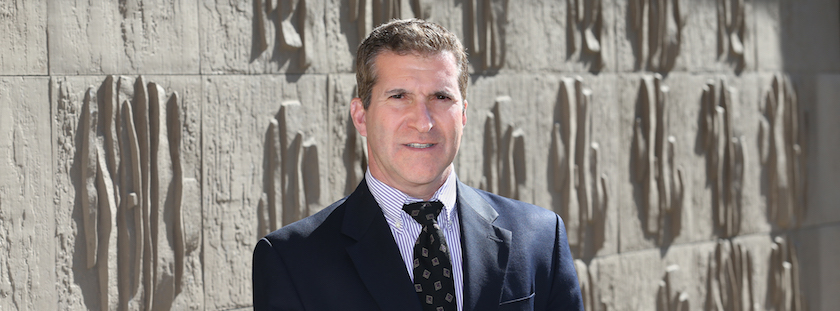Dubow's studies of violence’s effects on children have wide impact

Although most have never met him, children the world over have an important advocate in Dr. Eric Dubow, a BGSU professor of psychology. For more than 25 years, his contributions to the field of child clinical psychology and child mental health, from research and theory to mentoring and student training, have earned him the respect of psychologists worldwide. An extraordinarily productive scholar known for his commitment to hard work, he has also served the profession both as a grant reviewer for the National Institutes of Health and more recently as editor of the prestigious journal Developmental Psychology.
The BGSU Board of Trustees recognized Dubow’s record of achievement and dedication by naming him a Distinguished Research Professor. Established in 1982 by the board of trustees, the title is conferred upon faculty members who hold the rank of professor and who have established outstanding national and international recognition through research and publication in their disciplines.
The title was conferred upon Dubow at the board’s Feb. 17 meeting. Dubow’s nomination for the honor included letters of support from Dr. Michael Zickar, chair of the BGSU psychology department; Dr. Kenneth Pargament, BGSU professor emeritus of psychology; Dr. Rowell Huesmann, the Amos N. Tversky Collegiate Professor of Communication Studies and Psychology at the University of Michigan (with whom he has worked for 36 years), and Dr. E. Mark Cummings, chair of the psychology department at the University of Notre Dame.
The impact of Dubow’s research into the roots of childhood aggression, its long-term effects into adulthood, and methods for assessing and ameliorating abnormal behavior is widely recognized, said his supporters, and has helped guide psychologists, school leaders and policy makers. He has published 76 articles in peer-reviewed journals and edited handbooks, and his work has been cited nearly 6,000 times, a reflection of his stature as a researcher. Since 1998 he has brought in more than $1.4 million in grant funding, which will continue through 2021. Much of it has been from the National Institute of Child and Human Development, the National Science Foundation and the American Psychological Foundation.
He is a “top world scholar in developmental psychology and aggression research,” Huesmann said.
He has taken a special interest in the effects of violence on children living among the Israeli-Palestinian conflict, which “breaks new ground toward a cutting-edge, process-oriented social-ecological understanding of political violence and child adjustment, particularly with regard to aggression,” Cummings wrote. Dubow and his collaborators have conducted longitudinal studies not only of violence’s impact, including post-traumatic stress, but also of the efficacy of intervention efforts and specific styles of parental behavior and protective factors such as resilience characteristics. Much of this work has been done with international collaborators through the University of Michigan Institute for Social Research, where he is a research professor in the Research Center for Group Dynamics’ Aggression Research Group.
In a world where violence is increasingly visible not only firsthand but in multiple other cultural environments, Dubow’s research into the connections between violence and the development of childhood aggression is especially relevant. He has examined timely issues of compulsive texting, television and video game violence and problem drinking. Locally, he and his graduate students have collaborated with the Bowling Green City Schools for more than 20 years implementing and evaluating a stress and coping curriculum for elementary school children. Further, he has for several years worked with the Wood County Family and Children First Council, the Wood County Alcohol, Drug Addiction and Mental Health Services Board, the Children’s Resource Center, Boys and Girls Clubs and Fostoria City Schools.
“As a child clinical psychologist, Dr. Dubow has been very much committed to research that holds practical implications for the mental health of children,” Pargament wrote. “For example, when he came to BGSU, he designed and implemented a primary prevention program, ‘I Can Do,’ to foster problem solving and resilience skills in elementary school children. It was, and remains, one of the finest examples of its kind and provided a remarkable service to the school systems in northwest Ohio for over 25 years.”
He is equally committed to preparing the next generation of child psychologists, Zickar said, and has had 36 Ph.D. students, with whom he has numerous co-authorships and many of whom have gone on to prestigious positions. He received the Outstanding Contributor to Graduate Education Award from Graduate Student Senate in 1993. He has also contributed on the administrative level, serving as director of graduate studies and chair of the Clinical Colloquium Committee in his department.
In addition to his NIH grant reviewing, Dubow has served in elected council positions for the International Society for Research for Aggression and as a consulting editor for the journal Aggressive Behavior. Since early in his career he has been a sought-after reviewer for the most prestigious developmental journals, which led to his being named consulting editor and associate editor for several, and finally to the top post at the flagship journal in the field, Developmental Psychology.
Although he is known as a “hard-nosed gatekeeper for important research,” Huesmann said, “he is also a teacher of young scholars. His decision letters are masterpieces of mentoring and reinforcing.”
Dubow has been on the BGSU faculty since 1985 and a full professor since 1995. He earned his bachelor’s degree in psychology from Columbia University in 1980, master’s degree in psychology from the University of Illinois-Chicago in 1982 and Ph.D. in clinical-developmental psychology in 1985, also from Illinois-Chicago. He is a member of the Society for Research on Child Development and the Society for Research on Adolescence.
Updated: 12/02/2017 12:18AM
